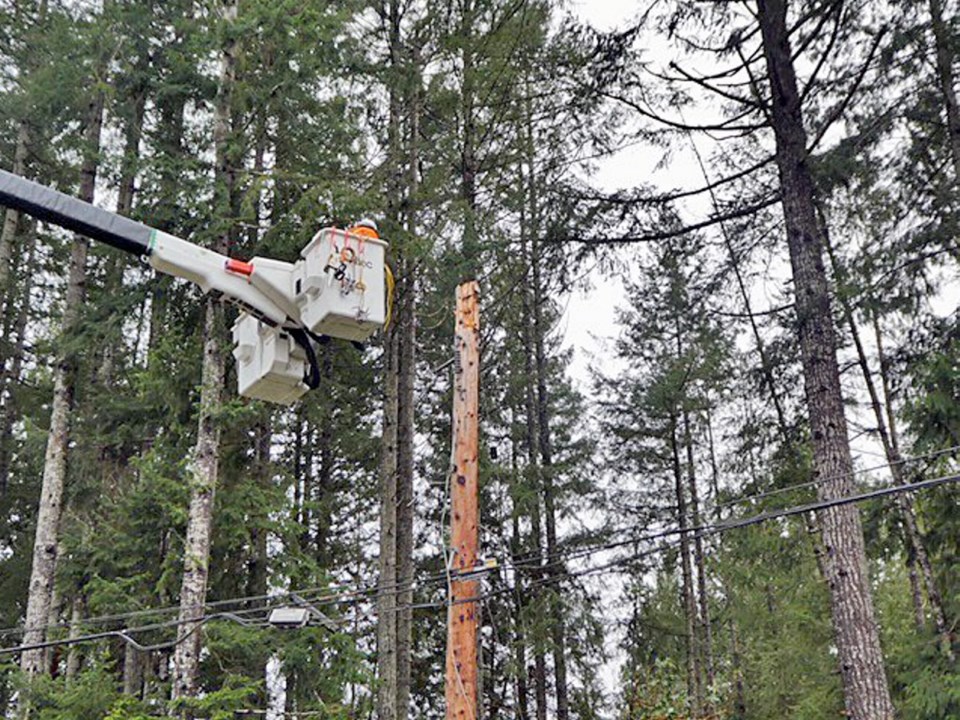Chris O’Riley, B.C. Hydro’s president and CEO, wishes to thank his customers for their “understanding and patience” during the recent power outages. If O’Riley cares to visit my part of Central Saanich, I’ll gladly introduce him to exactly how much understanding and patience there is.
O’Riley blames the loss of power to 756,000 customers — some for more than a week — on a powerful wind and rain storm. Note: By “customers” he merely means addresses, not the actual numbers of people affected, who probably add up to half the province’s population.
Although he doesn’t use the phrase, reading between the lines, this was all an act of God.
Now I’m happy to admit that wind and rain might well be laid at the door of the Almighty. But the real cause behind most of the damage is the longstanding failure of B.C. Hydro to keep its urban lines clear of overhanging branches.
I live in Central Saanich. On average, the power on our street is out about three times a year. And the reason is simple.
Drive around the municipality. In most residential areas, you’ll find wires threaded through the canopies of roadside trees. Every one of those is an outage waiting to happen.
It’s true you do sometimes see crews lopping the most egregious examples as a safety precaution. But the problem is that most of those lines were erected decades ago, at some distance from adjacent trees, which had yet to reach maturity.
Now, with the passage of time, what was once a relatively secure system has become as fragile as the timber that has overgrown it.
O’Riley notes that in several cases, whole trunks came down. It appears several of these blocked rural roads and prevented crews reaching their destinations, hence the prolonged wait for some customers.
Fair enough. I agree there’s only so much you can do about that, although, again, some of this was foreseeable.
Urban trees are more vulnerable, because the construction of houses, sidewalks and roads over their root systems puts them at risk. Why wait for them to collapse before removing them?
The hard truth is that, if you believe in climate change, this is only going to get worse. We had outages nearly as bad in 2006 and 2015.
The answer, it seems to me, is a program over several years of aggressive tree-lopping and, where required, removal. Not all of this need fall on B.C. Hydro’s shoulders.
There is no reason why our local governments, particularly the suburban municipalities, shouldn’t lend a hand. Senior levels of government also have a duty here.
In 2003, a massive power outage struck Ontario and several neighbouring U.S. states. More than 50 million people were affected, and $10 billion US in economic losses were caused.
In the aftermath, a cross-border task force was struck. The group concluded that the primary causes of the outage were the “three Ts” — trees, tools and training. We had too many of the first, and too little of the others.
To prevent a recurrence, the task force recommended mandatory standards of electricity reliability. Good idea.
Across Canada, each provincial government was given the authority to impose fines on electricity suppliers who failed to meet reliability standards. In B.C., our utilities commission can levy fines of up to $1 million a day.
Yet to date, B.C. Hydro has never once been penalized. You might think leaving half its customers in the dark would count as a failure by any reasonable standard of reliability. Apparently, only the apocalypse will do.
I appreciate the logistical problems involved in a major tree-pruning program. Against that, what are the costs of shutting down nearly half the province, in some cases for days during the Christmas celebrations?
The reality is some developing-world countries get more reliable service than we do. Praising customers for their patience is all fine and well, but it’s time for some new thinking in the upper ranks of B.C. Hydro.



